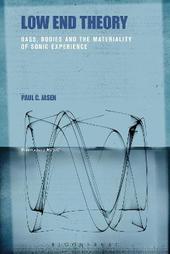
|
Low End Theory: Bass, Bodies and the Materiality of Sonic Experience
Hardback
Main Details
| Title |
Low End Theory: Bass, Bodies and the Materiality of Sonic Experience
|
| Authors and Contributors |
By (author) Dr. Paul C. Jasen
|
| Physical Properties |
| Format:Hardback | | Pages:296 | | Dimensions(mm): Height 229,Width 152 |
|
| Category/Genre | Theory of music and musicology |
|---|
| ISBN/Barcode |
9781501309939
|
| Classifications | Dewey:781.23 |
|---|
| Audience | | Tertiary Education (US: College) | |
|---|
|
Publishing Details |
| Publisher |
Bloomsbury Publishing Plc
|
| Imprint |
Bloomsbury Academic USA
|
| Publication Date |
24 March 2016 |
| Publication Country |
United States
|
Description
Low End Theory probes the much-mythologized field of bass and low-frequency sound. It begins in music but quickly moves far beyond, following vibratory phenomena across time, disciplines and disparate cultural spheres (including hauntings, laboratories, organ workshops, burial mounds, sound art, studios, dancefloors, infrasonic anomalies, and a global mystery called The Hum). Low End Theory asks what it is about bass that has fascinated us for so long and made it such a busy site of bio-technological experimentation, driving developments in science, technology, the arts, and religious culture. The guiding question is not so much what we make of bass, but what it makes of us: how does it undulate and unsettle; how does it incite; how does it draw bodily thought into new equations with itself and its surroundings? Low End Theory is the first book to survey this sonorous terrain and devise a conceptual language proper to it. With its focus on sound's structuring agency and the multi-sensory aspects of sonic experience, it stands to make a transformative contribution to the study of music and sound, while pushing scholarship on affect, materiality, and the senses into fertile new territory. Through energetic and creative prose, Low End Theory works to put thought in touch with the vibratory encounter as no scholarly book has done before. For more information, visit: http://www.lowendtheorybook.com/
Author Biography
Paul C. Jasen is a Lecturer in Music and Communication Studies at Carleton University, Canada.
ReviewsThere's much here that gives a compelling and productive slant on one of the most contested areas of contemporary audio culture. * The Wire * Low End Theory is a fascinating study ... An interesting and thoughtful addition to the greater discussion of sound materiality, and will serve as excellent graduate level reading for ethnomusicologists, folklorists and anthropologists alike. * Dancecult * Low End Theory is an extremely broad-ranging book that refreshingly challenges the divisions between the humanities and sciences in terms of our understanding of sound, stretching this understanding from a wide-ranging interdisciplinary base. The core chapters represent a tour de force analysis of sound, body and experience that is both exhilarating and challenging. The reader will feel that they are racing through a stimulating sonic haze picking up wonderful nuggets of sonic knowledge on the way. * Michael Bull, Professor of Sound Studies, University of Sussex, UK * A pioneering study of the murky world of bass that enlists speculative concepts to reveal the vibrational practices at work in ritual, science and in the underbelly of pop. Low End Theory contributes to a growing literature which recognises, tracks and encourages the perpetual reconstruction the sonic body. * Steve Goodman, Independent Scholar, UK, author of Sonic Warfare: Sound, Affect and the Ecology of Fear (2010) and Founder of record label Hyperdub * We live in a world of vibrations. Sound envelops us, moves us, caresses or assaults us-especially in the lower frequencies that we cannot hear directly. In Low End Theory, Paul Jasen provides us with an ontology of bass. He works through the many ways-natural, social, and technological-that subsonic frequencies haunt us, affect us, and change us. * Steven Shaviro, DeRoy Professor of English, Wayne State University, USA * "...a rewarding read...By now widely travelled and well-thumbed, my copy of Low End Theory obviously affected me more than many other books I have recently read... * Oliver Seibt, Musicae Scientiae *
|